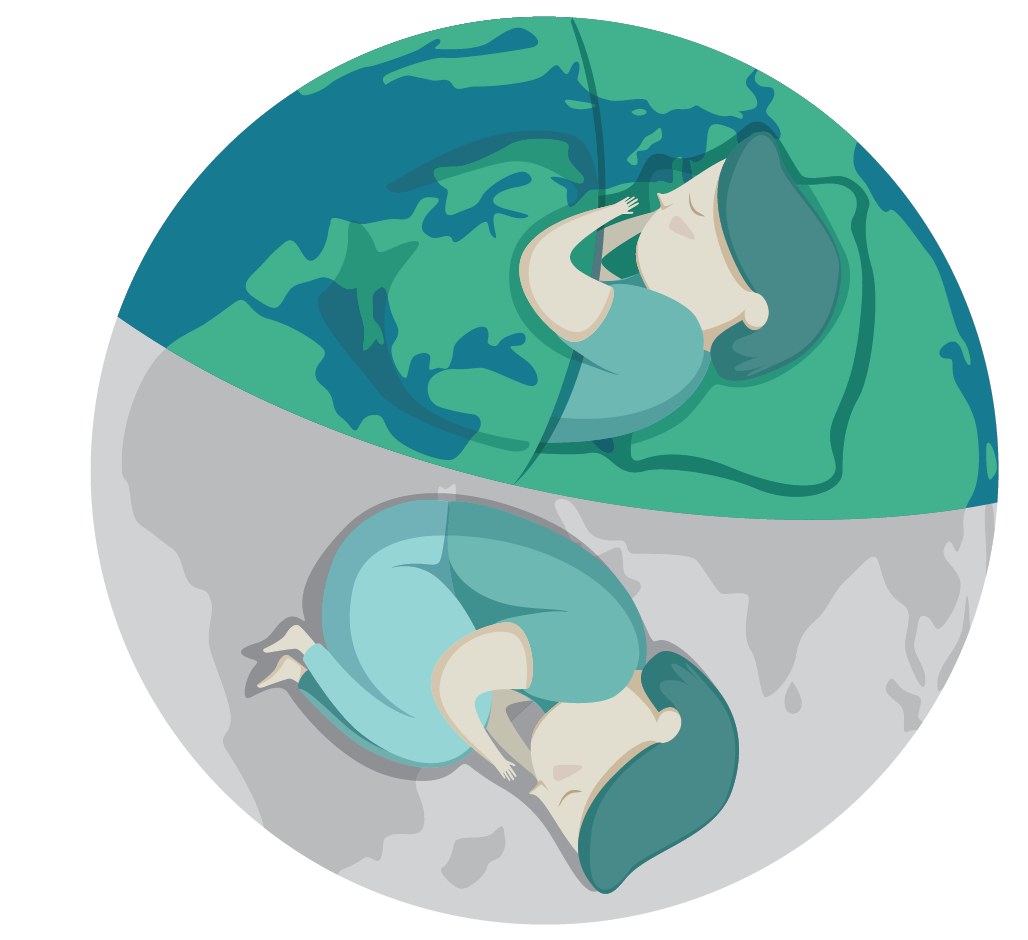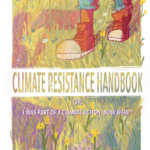Space considerations: It is recommended that the game be played in an area where the participants can be placed side by side and in a single row, where they have space in front of them to take multiple steps forward.

Parata is about the problems caused by climate change through practices in daily life. It’s a non-threatening way to explore how the effects of climate change will change based on different segments of society and socio-economic levels. The debrief of the game can be powerful to explore the concept of climate justice.
The game takes place in a small country called Parata. Parata, an imaginary country, with rich agricultural lands rich in natural assets.
- To play the game, there should be 1 narrator (facilitator) and at least 12 participants.
- Explain the general flow of what will happen. Then each participant selects one role card at random. The role cards have information about people with different income, ethnic origin and status. There are 13 different role cards in total. You can write more or duplicate with more than 13 participants (especially since each person may interpret the same roles a little differently).
The roles are:
- You’re the president of oil company inherited from your family. You are wealthy, come from British background, and live in the capital city, San-Parta.
- You’re a worker in a fast-food chain in the capital San-Parta. You cannot afford rent in the city, so you commute to your job. You come from indigenous background.
- You are a peasant woman with 3 children. You live in a fishing village in a small hut. You help pull the nets in for a basic wage.
- You are a Haitian refugee with two children who came illegally into the capital San-Parta. You live with ten others in a small apartment. You do odd jobs to make ends meet.
- You’re a middle-aged disabled person living in the capital San-Parta with a modest income. You do not travel much because of your disability, but you enjoy some nights at the theater with your family. Your family is of mixed background (indigenous, British, various new immigrants).
- You are a 94-year-old chaplain from the capital living in the South. You live on a very modest government stipend. Your family is of mixed background (indigenous, British, various new immigrants).
- You are a rich Englishman with only one child who exports tar sands abroad. You have two homes in the capital city, San-Parta and a home in Europe when you travel.
- You’re a 27-year-old woman who used to be a school teacher in Haiti but now has no job and lives in a refugee camp in San-Parata. Your mother was indigenous and your father’s background is unknown.
- You are a single woman with a single unemployed child living in the capital. You’re a racial minority and regularly discriminated against. You share an apartment with two others to afford the rent.
- You are a middle-class man with 4 children.You live in the South. Your family’s ancestry is ¼ indigenous and ¾ the racial majority in the country.
- You’re a Muslim single-mother of 2 children. You work in a grocery store and make only enough to feed your family. They live in your rented apartment in the outskirts of a fishing village.
- You are an indegenous person living in traditional huts of South Parata. You find odd jobs.
- You’re a Hollywood star who came to Parata for a movie and then decided to settle down here. You often travel across continents. You have four homes in different countries.
Read or share the description of Parata to everyone:
What happened to Parata (Historical background)
Parata is a small country. Indigenous people have established an advanced civilization in the 14th century thanks to the fertile agricultural lands, maritime activities and mining. However, with its “discovery” by Europeans, the people of Parata lost their freedom and their civilizations were plundered and they became a British colony.
After India declared its independence from the UK as a result of a long struggle, the anti-imperialist winds blew through Latin America, Africa, and eventually Parata gained its independence. Parata, which has a tense relationship with the Western Block until the end of the Cold War, began its oil extraction activities in 1992 when it discovered the crude oil deposits within the continental shelf. After the Cold War, Parata quickly moved to a market economy from a closed economic model, and in 2019, it held 12% of the remaining world oil reserves.
Subsidies given to oil companies by the central government increased the power of the fossil fuel industries in the country. Oil rich reserves located in southern shores of Parata have been drilled, causing environmental problems in South Parata. People living in fisher towns are having difficulties reaching their fish resources. While South Parata becomes more and more fragile, many leading entrepreneurs live in the capital San-Parta located in the North and invest in infrastructure and urban renewal projects in the capital. San-Parta appears as the shining star of Parata that symbolizes the “economic development” of the country.
Parata is currently a majority Christian country with a small religious minority. Most people retain some indigenous heritage, but most people cannot trace their ancestors back very far. There is a small indigenous population still living in traditional ways.
Have the participants consider the reality of what’s happening in their lives now. Think about the flow of their daily lives based on their role and really getting into the character and their situation. Since the card doesn’t explain everything, they can make up the rest of their story.
Give participants 3 minutes to review their card and add anything to their own backstory. It is helpful for all participants to get into character and have rich, deep backstories.
- How was your childhood? How was your house? What kind of games would you play? What did your parents do?
- How is your daily life right now? In what environments do you socialize? What do you do in the morning, afternoon and evening?
- What kind of life do you have? Where do you live? How much do you earn per month? What do you do in your free time? What do you do on holidays? (Do you get any holidays?) What are the things that excites you? What are the things that frighten you?
- Would you like to be another person?
- What do you think about environmental protection?
Important note: Participants do not tell their role to other participants.
- Facilitator reads a line and then pause for people to decide. Each participant is expected to decide if they should step forward or not based on what is read. The rest stay there.
- It’s a normal day. Aside from the sudden weather events, step forward if global warming and the climate crisis do not affect your everyday life practices.
- Things remain calm in the country of Parata. Step forward if you’re not worried about the future of your children, believing you can give them enough cultural and economic advantanges for their future.
- Due to budget constraints, the government cuts funding for its welfare program. Step forward if those cuts do not affect you.
- You hear rumors of a hurricane coming in the next few months. Step forward if you have enough basic food for yourself and your family right now.
- The storm gets closer. Step forward if you have the money to invest in building some defenses to protect you against the possible storm.
- The media are reporting the storm will be a big one. Step forward if you can afford to move to a safer location temporarily.
- It’s a day before the hurricane. The government announces you should evacuate, but it has no capacity to help people move and no NGOs are around. Step forward if you can get away from the area and get yourself and your family to security.
- The hurricane hits. It’s a huge one. You all know people affected. Everyone takes two steps back.
- In the aftermath of the storm, housing prices sky-rocket. Step forward if you have the money to buy a house that’s about 1.5 more expensive than normal.
- Due to flooding, access to clean drinking water is harder than usual. Step forward if you have the money to make sure you can reach enough water for yourself and your family.
- With waste all over the country, diseases spread quickly. The hospital system is stretched past its limits, but is still functioning. Step forward if you still have access to health services to protect against spreading epidemic diseases.
- Months later, the rising temperatures have wiped out the local kiwi production in Parata. Step forward if you can afford the pricier kiwis from the imported products section of your regional market every Thursday.
Important note: Due to the differences in role cards, there may be participants who step in all situations, or there may be participants who do not take steps in any case. Once the narrator has read all of the situations and everyone has reacted, each participant may be at a different level in the field of play.
- Ask the participants to describe their roles, what they feel and felt throughout the game (ex: what did you feel while taking certain steps?). While the participants share their thoughts and feelings, links with current situations can be established (ex: are there any similarities between the imaginary situation and real ones?).
(Note: Some participants may wonder “if I stepped forward or not” at the right time. Since this is a role-play, there’s not really a right or wrong choice. The key is connection, empathy, and linking to issues of climate justice in the real world.) - In order to generalize the subject, the facilitator can ask questions about the ways the participants notice climate / environmental injustices in their society. This part opens a space to discuss how diverse identities such as gender, ethnicity and socio-economic status are impacted differently by climate change. Notice which people are already impacted by other forms of oppressions. Underline the responses that looks like definitions of climate injustice and create a list.
- Finally, make pairs and ask participants to look at the list that shows different aspects of climate injustice. Make them choose one of those responses in the list and invite them to discuss how that particular injustice might be prevented and what climate justice would mean in that specific context.
